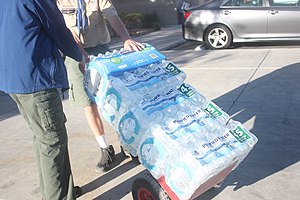
Bottled water, in developed countries, is a waste of resources, in terms of plastic, fuel for transport, and the efforts spent on manufacturing, handling advertising and selling.
In poor communities, it may sometimes be necessary for safety's sake, especially when it is not possible to purify water by yourself. (See Choosing water supply and purification methods.) However, if there is an alternative, reliable source, this is both a significant cost saving and potentially more sustainable.
Taste[edit | edit source]
It is sometimes said that people cannot tell the difference between bottled water and tap water (though obviously this could depend on the quality of tap water.) Have reliable studies been carried out? If so, please add them here. In any case, such a study could be a way of shining attention to this wasteful practice. Perhaps a double-blind study could be conducted in a manner similar to the famous Pepsi/Coke tests.[expansion needed] At the same time, the study could look at commercially available home water filters, and/or the effect of leaving tap water in a wide-mouthed bottle for a few hours for the chlorine (and perhaps the chlorine by-products) to dissipate into the atmosphere.
See also[edit | edit source]
External links[edit | edit source]
- ethos-water.com - satirical site about Ethos Water[1], owned by Starbucks, highlighting the large profits made compared to the small amount donated.